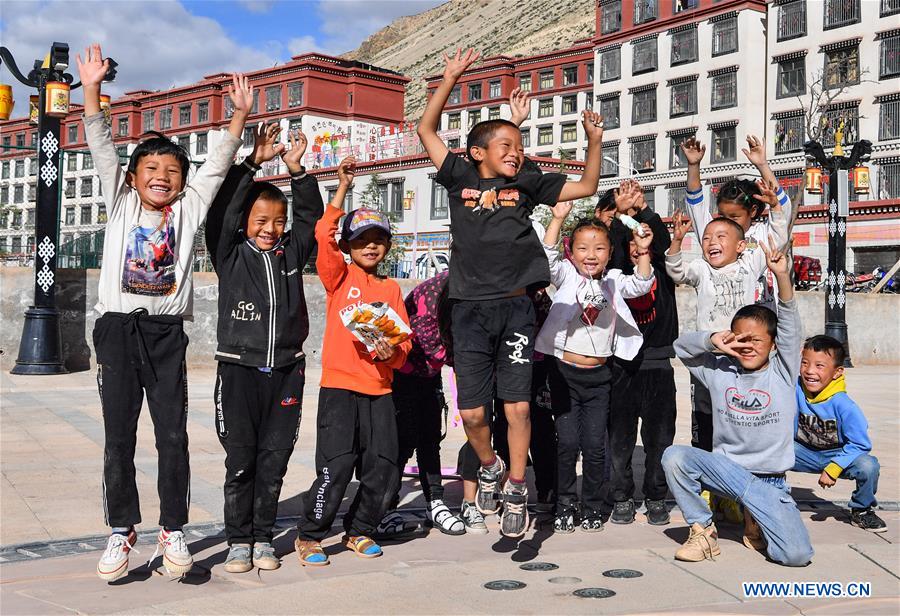 ?
?Children hail as they play at a relocation site in Baxoi County, southwest China's Tibet Autonomous Region, Sept. 19, 2020. Southwest China's Tibet Autonomous Region has accomplished the historical feat of eradicating absolute poverty, according to a press briefing held in the regional capital of Lhasa on Thursday. (Xinhua/Jigme Dorje)
LHASA, Oct. 15 (Xinhua) -- Southwest China's Tibet Autonomous Region has accomplished the historical feat of eradicating absolute poverty, according to a press briefing held in the regional capital of Lhasa on Thursday.
By the end of 2019, Tibet had lifted 628,000 people out of poverty and delisted 74 county-level areas from the poverty list, said Wu Yingjie, Communist Party of China chief of Tibet, calling the achievement a "major victory."
The average annual net income of poor people in Tibet had risen from 1,499 yuan (about 220.44 U.S. dollars) in 2015 to 9,328 yuan in 2019, Wu said.
Since the beginning of this year, Tibet has shifted its focus from tackling absolute poverty to consolidating poverty alleviation achievements, he said.
Tibet's major victory in poverty alleviation attests to the advantages of the socialist system on the high plateau, Wu said.
Known as the "Roof of the World," Tibet is famous for its picturesque plateau landscape and rich ethnic culture. It is one of the main battlegrounds in China's nationwide campaign against poverty.
"The elimination of absolute poverty in Tibet is a major achievement of China's poverty alleviation campaign in the new era," says a document released at the briefing, noting that the feat has greatly enhanced the modernization drive in Tibet.
Since 2016, Tibet has spent 74.8 billion yuan of agriculture-related fund in poverty alleviation, with an average annual increase of over 15 percent, Wu said.
He cited poverty alleviation projects and relocation programs, among other measures, as useful experience in eliminating absolute poverty in Tibet.
Since 2016, a total of 39.89 billion yuan has been invested in over 2,900 poverty alleviation projects, which helped lift more than 238,000 impoverished people out of poverty and benefited more than 840,000 people, according to Wu.
Authorities in Tibet have made great efforts in relocating impoverished people living in severe natural conditions to areas with relatively rich production materials and better infrastructure.
To date, the construction of 965 relocation sites has been completed and 266,000 people have moved into new houses. "The relocation programs were carried out entirely on a voluntary basis," Wu said.
A third-party assessment on the anti-poverty efforts in Tibet showed that the satisfaction rate among local people in the region was over 99 percent.
"The historical achievement of eliminating absolute poverty in Tibet not only marks a milestone in China's campaign against poverty but also serves as an exemplary case and a huge booster for the global poverty reduction cause," said Thubten Kehdrup, a professor with Tibet University. Enditem



